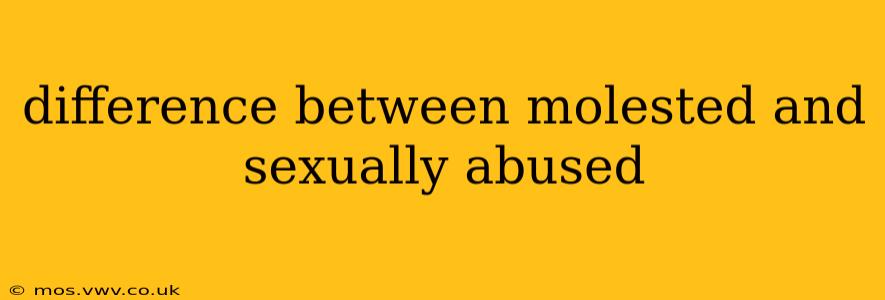The Difference Between Molested and Sexually Abused: Understanding the Nuances
The terms "molested" and "sexually abused" are often used interchangeably, leading to confusion. While they are closely related and frequently overlap, there are subtle but important distinctions. Understanding these differences is crucial for accurate reporting, appropriate support for survivors, and effective legal processes.
This article aims to clarify the nuances between these terms, drawing on legal definitions and the experiences of survivors. We'll also address frequently asked questions surrounding these sensitive topics.
What is Molestation?
Molestation typically refers to any form of sexual contact that is unwanted, non-consensual, and inappropriate, particularly involving a child or vulnerable adult. It often encompasses a range of actions, from touching in inappropriate areas to more serious acts. The key element is the violation of boundaries and the power imbalance inherent in the situation. The term often implies a less severe form of abuse than "sexual abuse," but this is not always the case. The severity depends greatly on the nature and extent of the contact, the age and vulnerability of the victim, and the relationship between the perpetrator and victim.
What is Sexual Abuse?
Sexual abuse is a broader term encompassing a wider range of harmful sexual acts. It includes molestation but also extends to behaviors such as rape, sexual assault, exploitation (e.g., child pornography), and other forms of sexual coercion or exploitation. Sexual abuse can involve physical contact, but also non-contact acts such as exhibitionism, voyeurism, or the use of technology to exploit or abuse a child. The focus is on the harm inflicted, the violation of the individual's autonomy, and the significant long-term impact on their emotional, psychological, and physical well-being.
Are Molestation and Sexual Abuse Always Distinct?
No, the terms are not always mutually exclusive. Molestation is a type of sexual abuse. All instances of molestation can be considered sexual abuse, but not all sexual abuse is molestation. For example, rape is a form of sexual abuse, but it wouldn't typically be described as molestation. The term "molestation" often carries a connotation of a less severe but still profoundly damaging act.
What are the Legal Ramifications?
The legal definitions of molestation and sexual abuse vary depending on jurisdiction and specific statutes. However, both are serious crimes with significant legal consequences for the perpetrator. The specific charges and sentencing will depend on the nature of the act, the victim's age, and other factors. It's crucial to consult with legal professionals for accurate and specific information in any given situation.
How Do These Terms Impact Survivors?
The emotional impact of both molestation and sexual abuse can be devastating and long-lasting. Survivors may experience a wide range of mental health issues including PTSD, anxiety, depression, and difficulty forming healthy relationships. The use of the terms themselves can be triggering, and the choice of which term to use should be made with sensitivity and respect for the survivor's experience and preferences.
Can you give examples of molestation and sexual abuse?
Examples of Molestation: Unwanted touching of genitals, kissing, or other inappropriate physical contact. These acts are characterized by the violation of personal boundaries and the power imbalance.
Examples of Sexual Abuse (that are not solely molestation): Rape, sexual assault, forcing someone to watch pornography, exploitation through child pornography, online grooming, and sexual coercion. These are actions that directly harm or exploit a person sexually, often involving a more severe violation than simple unwanted touching.
What if I or someone I know needs help?
If you or someone you know has experienced molestation or sexual abuse, it's essential to seek help immediately. There are numerous resources available, including:
- National Sexual Assault Hotline: (800) 656-HOPE
- RAINN (Rape, Abuse & Incest National Network): https://www.rainn.org
Remember, seeking help is a sign of strength, not weakness. Recovery is possible, and support is available. The first step is reaching out for help.
This information is for educational purposes only and should not be considered legal or medical advice. Always consult with qualified professionals for specific guidance.
